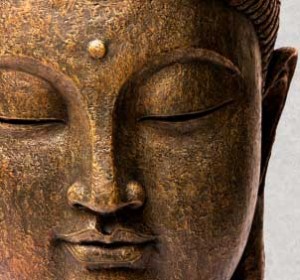
He who puts on the yellow robe while he is yet impure, lacking in self-control and lacking in loyalty, truly he is unworthy to wear the yellow robe of the monk.
Of course, the yellow robe, in the literal sense, is the robe of the Buddhist monks; it became the robe of all who practiced asceticism. But this is not what the Dhammapada truly means to say, because there is no lack of men who wear the yellow robe but are not purified of their taints. The yellow robe is taken as the symbol of consecration to the spiritual life, the external sign of renunciation of all that is not an exclusive concentration upon the spiritual life.
What Buddhism means by “impurities” is chiefly egoism and ignorance; because, from the Buddhist standpoint, the greatest of all taints is ignorance, not ignorance of external things, of the laws of Nature and of all that you learn at school, but the ignorance of the deepest truth of things, of the law of the being, of the Dharma.
It is noteworthy that the two defects insisted upon here are lack of self-control and lack of loyalty. Loyalty means here sincerity, honesty; what the Dhammapada censures most severely is hypocrisy: to pretend that you want to live the spiritual life and not to do it, to pretend that you want to seek the truth and not to do it, to display the external signs of consecration to the divine life—here symbolised by the yellow robe—but within to be concerned only with oneself, one’s selfishness and one’s own needs.
It is interesting to note the insistence of the Dhammapada on self-control, for according to the Buddhist teaching, excess in all things is bad. The Buddha always insisted on the Middle Path. You must not be too much on one side nor too much on the other, exaggerate one thing or the other. You must have measure, balance in all things, the balance of moderation.
Therefore the qualities that make you worthy of leading the spiritual life are to have an inner balance, a balance in your action, and to be moderate in everything, to be sincere, honest, loyal.
But he who has discarded all impurity, who is firmly attached to the precepts of morality, who knows how to moderate his appetite and who is loyal, he, truly, is worthy to wear the yellow robe.
I would not like you to take this text as a moral catechism. It certainly has a much deeper and truer meaning, because in all truly spiritual teachings, morality as it is mentally conceived is out of place.
So too the word “impurity”. Pure, as it is understood morally, has not at all the meaning it is given in a truly spiritual teaching; and particularly from the Buddhist standpoint, purity is absence of ignorance, as I have already told you last time, and ignorance means ignoring the inner law, the truth of the being. And loyalty means not to take the illusion for the reality, the changing and fluctuating appearances for the inner and real permanence of the being.
We can say then that self-control and self-mastery, measure, absence of desire, the search for the inner truth of the being and the law of its self-manifestation are very necessary preoccupations for those who want to practise the spiritual life.
To be true to oneself, to one’s goal, not to let oneself be moved by disorderly impulses, not to take the changing appearances for the Reality, these are the virtues that one must have in order to progress on the way of spirituality.
The Mother





